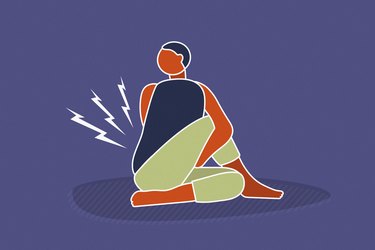
Especially when you've been working at a desk all day or cooped up in a tiny apartment during quarantine, there's nothing better than arching or swiveling your stiff spine, hearing a gratifying "pop" and feeling your tight muscles relax.
But much like munching a few cookies after dinner every night or reaching for your phone the second it dings, not everything that feels good in the moment is good for you in the long-run. Does cracking your back fall into this category?
Video of the Day
Video of the Day
Here, experts reveal what happens when you crack your back (don't worry, you're not actually breaking anything), why it's so freaking pleasurable and what could go wrong.
What Happens When You Crack Your Back
First, let's talk about how your spine works. Your backbone gives critical support to the rest of your body, holding you upright and allowing you to move fluidly. It also protects your spinal cord, a column of nerves that sends messages between your brain and your body, forming the central nervous system, which controls movement, sensation and bodily function.
The spinal cord is surrounded by 24 vertebrae, small bones stacked one on top of the other that form the spine. Between each vertebra is a disc, a squishy cushion that absorbs impact and prevents the bones from rubbing against each other. Ligaments connect the vertebrae and tendons attach muscles to the vertebrae. In between the bones are hinge-like joints (called facet joints) that give you the flexibility to bend and twist.
Now here's where we get into cracking. Inside each facet joint is a thick liquid called synovial fluid, which delivers nutrients to your joints and lubricates them so they glide smoothly. An April 2015 study in PLOS One analyzed MRIs of knuckles cracking and discovered that when you flex, contort or arch in order to crack, the joints rapidly separate, creating air pockets within the synovial fluid. The researchers thought that as these air pockets form, they emit a popping noise. It's sort of like a cork being pulled out of a wine bottle.
Still, the cause of the "pop" is up for debate. A March 2018 article in Nature suggests that the cracking sound is made when air bubbles formed within the synovial fluid collapse.
The sound can also come from your tendons and ligaments rubbing against your joints when you stretch into a crack, Chukwuemeka Nwodim, MD, an orthopaedic surgeon and member of The Centers for Advanced Orthopaedics, tells LIVESTRONG.com.
Why Does Cracking Your Back Feel So Good?
This is also a bit of a mystery.
"There is no definitive scientific answer to why individuals experience pleasure from cracking their neck or back," Dr. Nwodim says. "But it may be due to the release of tension and pressure around the spinal muscles, ligaments, tendons and connective tissues."
After staring at your computer or hunching over your phone for hours, your back probably feels pretty sore.
"Your muscles get tight due to decreased oxygen and blood flow from a lack of movement," Thomas J. Lotus, DC, orthopedic chiropractor with Midwest Orthopaedics at Rush University Medical Center in Chicago, tells LIVESTRONG.com.
When you deeply stretch your back in order to coax out a crack, you're lengthening and loosening those clenched muscles, while delivering extra blood flow, oxygen and nutrients to them.
"Cracking your back also provides an endorphin release," Lotus says. A surge of these mood-boosting chemicals leads to a sense of satisfaction and relief. Ahhh!
Why Are Some Backs Extra-Crackable?
Even though your spine might pop and snap on a dime, others are tougher to crack.
"This is due to your unique anatomy — just as some people are more flexible than others, some also have a greater ability to manipulate the tissues within their body," Dr. Nwodim says. "Genetics also plays a significant role, as some individuals are genetically inclined to have more lax muscles, tendons and ligaments."
In other words, the looser you are, the more easily you'll be able to crack.
But no matter how flexible you are, chances are you won't be able to crack your back twice in a row. According to the PLOS One study, your joints become resistant to further popping for about 20 minutes post-crack.
4 Reasons Not to Crack Your Back

We hate to be a buzzkill, because we know how satisfying it can be to give your spine a snap. But there's a chance you could do more harm than good in the process.
1. You Can Wear Down Your Cartilage
Cartilage is strong, smooth connective tissue located at the ends of your bones, including the vertebrae of the spine. It's a shock absorber that allows your bones to slide past each other without friction and distributes weight evenly across the joints.
Unfortunately, like cellphone batteries and summer vacation, cartilage doesn't last forever.
"Each of us is born with a finite amount of cartilage, which is at its thickest and healthiest in the early stages of life," Dr. Nwodim says. "As time goes on, this cartilage slowly and naturally degenerates."
According to a July 2013 study in BioMed Research International, cartilage erosion is a result of wear and tear, as well as age-related changes to cells and tissue.
"It's key to take care of your cartilage and minimize activities that accelerate degeneration," Dr. Nwodim says. "Aggressive or excessive back cracking can lead to degradation of the cartilage within the facet joints."
2. It Promotes Hypermobility
Hypermobility is when you can easily move certain joints beyond the normal end range of motion. Although being flexible is generally a positive thing, stretching your joints too far might lead to instability, pain and injury.
"If you have hypermobility, you can't stabilize as well," Lotus says. "As a result, you are depending on your muscles and tendons to do more work to stabilize, which could lead to repetitive injuries."
Imagine trying to hold a strand of wobbly cooked spaghetti up straight. It takes a lot more effort than if you stood a stiff, uncooked spaghetti strand upright.
"There is a happy medium," Lotus says. "You want joint motion and muscle control."
3. In Very Rare Cases, You Could Suffer a Stroke
In May 2019, a 28-year-old Oklahoma man made headlines when he cracked his neck and induced a stroke. Apparently, he tore an artery in his neck leading to his brain.
And in April of that year, the Daily Mail reported that a 23-year-old woman in London also triggered a stroke by cracking her neck. An artery in her neck burst, causing a blood clot to form in her brain. (After being treated in the hospital, both of them were OK!)
Although this is not the norm, you may want to steer clear of cracking if you're at higher risk of stroke. According to the American Stroke Association, risk factors include heart disease, smoking, diabetes, obesity and high cholesterol.
4. You Could Injure Your Spine
If you have an underlying structural instability, cracking can damage your back. According to Dr. Nwodim, you're in danger of getting hurt if you have an infection involving the spine, a tumor, an acute or chronic injury (such as a fracture or major ligament injury) or spinal stenosis (narrowing of the spinal canal).
You should also lay off cracking if you've had herniated discs. "Spinal manipulation could cause further herniation and neurologic compromise," Dr. Nwodim says.
Warning
If you feel pain while you are cracking your back or afterward — particularly if it’s long-lasting — call your doctor for an assessment.
5 Tips to Stop Cracking Your Back

The experts agree that the best way to kick a back-cracking habit is to alleviate the root of the problem: muscle soreness. Try these ideas:
1. Get Moving
The more sedentary you are, the more back pain you'll have and the greater the urge to crack may be.
"If you are active, you won't have as much tightness in your back," Lotus says. "When you are sitting behind a desk, take micro-breaks every 45 minutes to get up and move."
An October 2017 review in the British Journal of Sports Medicine found that regular physical activity decreased the risk of chronic lower back pain by 11 to 17 percent.
2. Support Your Spine
In a small July 2013 study in Chiropractic & Manual Therapies, a supportive lumbar pillow led to significant improvements in posture and low back pain.
"Placing a lumbar roll in the small of your back improves your ergonomics," Lotus says. "If you have correct posture, you will be less likely to feel stiff."
3. Gently Stretch It Out
"Replace the cracking habit with activities that are just as effective in relieving muscle tension, but more productive and constructive to your skeletal health, such as controlled stretching," Dr. Nwodim says.
A December 2012 study in Pain Management Nursing found a significant reduction in lower back pain among people who followed a stretching program.
Although the best stretches for you depend on your specific physical anatomy, here's one that works for almost everyone: "Stand up and reach to the sky," Lotus says.
4. See a Pro
If you're experiencing lingering back or neck tension, get professional help. A September 2018 study in Pain Therapy confirmed that physical therapy should be a first-line treatment for chronic back pain.
"Find a chiropractic physician or physical therapist who is credentialed in McKenzie Institute Physical Therapy," Lotus says. "It is the most researched, reliable and specific exercise protocol there is."
He or she can create a custom stretching and strengthening plan that is tailored to address your individual issues and anatomy.
5. Give Your Back Some TLC
Just in case you need an excuse to book yourself a rubdown: In a March 2017 study in Pain Medicine, people who completed 10 massage sessions with a licensed massage therapist reported clinically meaningful reductions in back pain.
So, How Bad Is It Really to Crack Your Back?
If you only crack once in a while, you're probably in the clear. "In my personal opinion, cracking one's neck or back is relatively safe," Dr. Nwodim says.
But the smartest course of action is to find a healthier way to unwind a tight spine. "Even if you don't feel pain when you do it, I wouldn't recommend it at all," Lotus says.
Because as awesome as it may feel, cracking your back isn't all it's cracked up to be.
- PLOS One: "Real-Time Visualization of Joint Cavitation"
- Nature: "A Mathematical Model for the Sounds Produced by Knuckle Cracking"
- BioMed Research International: "The Age-Related Changes in Cartilage and Osteoarthritis"
- American Stroke Association: "Stroke Risk Factors"
- British Journal of Sports Medicine: "Does leisure time physical activity protect against low back pain? Systematic review and meta-analysis of 36 prospective cohort studies"
- Pain Management Nursing: "Effectiveness of a Stretching Exercise Program on Low Back Pain and Exercise Self-Efficacy Among Nurses in Taiwan: A Randomized Clinical Trial"
- Chiropractic & Manual Therapies: "The effect of a lumbar support pillow on lumbar posture and comfort during a prolonged seated task"
- Pain Therapy: "Physical Therapy Approaches in the Treatment of Low Back Pain"
- Pain Medicine: "Real-World Massage Therapy Produces Meaningful Effectiveness Signal for Primary Care Patients with Chronic Low Back Pain: Results of a Repeated Measures Cohort Study"
- British Journal of General Practice: "Making health habitual: the psychology of ‘habit-formation’ and general practice"
- University of Maryland Medical Center: "A Patient's Guide to Anatomy and Function of the Spine"
Is this an emergency? If you are experiencing serious medical symptoms, please see the National Library of Medicine’s list of signs you need emergency medical attention or call 911.
